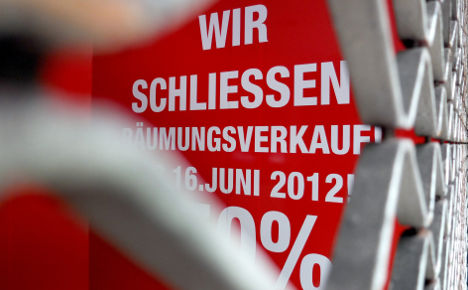The Ifo economic institute’s closely watched business climate index fell to 104.4 points in April from 106.7 points in March.
That was a bigger drop than expected: analysts had been pencilling in only a very slight decrease this month to 106.2 points.
“Although the majority of companies assessed their current business situation as good, they were far more cautious than last month. Their expectations regarding future business developments were also lower. The German economy is taking a breather,” said Ifo economist Kai Carstensen.
Ifo calculates its headline index on the basis of companies’ assessments of their current business and the outlook for the next six months.
The sub-index measuring current business slipped to 107.2 points in April – its lowest level in four months — from 109.9 points in March. And the outlook sub-index fell by two whole points to 101.6 points.
Analysts said the drop – the second consecutively monthly decline – wiped out the sharp increase seen in February, when the index reached a 10-month high.
“Both the current assessment and expectations indicators decline by around two points in April, a sign that the German economy has not been spared from the ongoing slowdown,” said Newedge Strategy analyst Annalisa Piazza.
“All in all, it is a quite gloomy report that confirms risks for the German economy in the first half of 2013,” she said.
“The decline clearly opens the door for a vivid discussion about a rate cut as early as in May as even the eurozone’s biggest economy is now losing momentum,” Piazza added.
In response to the debt crisis, the ECB slashed its key interest rate to a historic low of 0.75 percent last July and has held it there since. But financial markets have speculated about a further cut in order to pull the eurozone economy out of recession.
Carsten Brzeski at ING DiBa said the Ifo data would at least put such a move back on the agenda.
“All in all, this week’s confidence indicators send a warning signal that 2013 is not 2009. Any rebound of the German economy after the contraction will be much bumpier and weaker than four years ago,” he said.
And worsening prospects for the German economy “could at least increase the silent support for more ECB action,” Brzeski suggested.
A rate cut may not kick-start economies but would weaken the euro exchange rate, which would offer some welcome relief for German exporters, the expert said.
Ben May at Capital Economics said the Ifo data “will add to concerns that the German recovery is starting to falter.”
“In all, then, while Germany still looks in better shape than the eurozone as a whole, we see the economy stagnating over the year as a whole,” May said.
Christian Schulz at Berenberg Bank also believed focus would now turn to the ECB.
“Resistance to a rate cut will be crumbling. Even Bundesbank President (Jens) Weidmann had sounded marginally more dovish recently,” he said.
A rate cut would not change much in the periphery, and the ECB would “more likely than not wait for another month as it publishes new economic forecasts in June, before deciding whether to cut rates or not,” he said.
“But we do expect ECB President Mario Draghi to send more dovish signals” after the upcoming policy meeting at the beginning of May, he concluded.
AFP/mry



 Please whitelist us to continue reading.
Please whitelist us to continue reading.
Member comments